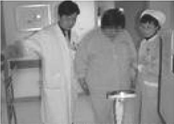网址:http://m.1010jiajiao.com/timu3_id_2595902[举报]
书面表达
假如你是中学生李华,你在学校食堂就餐的过程中,发现学生浪费饭菜的行为十分严重,你深感痛心和羞愧。请给校长写一封信。
1.说明写信的目的;
2.对这些行为进行批评;
3.提出切实可行的建议。
1.词数100左右;
2.可以适当增加细节,以使行文连贯;
3.开头和结束语已为你写好。
I'm Li Hua, a student from Senior Three.________________
Yours faithfully,
Li Hua
| |||||||||||||||||||||||||||||||||||||||||||||||||||||||||||||||||||||||||
Like most people, I’ve long understood that I’ll be judged by my occupation, that my profession is used by people to see how talented I am. Recently, however, I was disappointed to see that it also decides how I’m treated as a person.
Last year I left a professional position as a small-town reporter and took a job waiting tables. As someone paid to serve food to people, I had customers say and do things to me I suppose they’d never say or do to the people they know. One night a man talking on his cell phone waved me away, then called me back with his finger a minute later, saying angrily that he was ready to order and asking where I’d been.
I had waited tables during summers in college and was treated like a peon(勤杂工) by plenty of people. But at 19 years old, I believed I deserved inferior(低等的)treatment from professional adults. Besides, people responded to me differently after I told them I was in college. Customers would joke that one day I’d be sitting at their table, waiting to be served.
Once I graduated I took a job at a community newspaper. From my first day, I heard a respectful tone from everyone who called me. I assumed this was the way the professional world worked--- politely and formally.
I soon found out differently. I sat several feet away from a person in advertising department with a similar name. Our calls would often get mixed up and someone asking for Kristen would be transferred to Christie. The mistake was immediately clear. Perhaps it was because of money, but people used a tone with Kristen that they never used with me.
It’s no secret that there’s a lot to put up with when waiting tables, and fortunately, much of it can be easily forgotten when you pocket the tips. The service industry exists to meet others’ needs. Still, it seemed that many of my customers didn’t get the difference between server and servant.
I’m now applying to graduate school, which means someday I’ll return to a profession where people need to be nice to me in order to get what they want. I think I’ll take them to dinner first, and see how they treat someone whose job is to serve them.
68. What makes the author disappointed?
A. Professionals tend to look down upon workers.
B. Talented people have to do the job waiting tables.
C. One’s position is used to measure one’s intelligence.
D. Occupation affects the way one is treated as a person.
69. What does the author intend to say by the example in Paragraph 2?
A. Waiting tables is a hard job.
B. Some customers are difficult to deal with.
C. The man making a phone call is absent-minded.
D. Some customers show no respect to those who serve them.
70. How did the author feel when waiting tables at the age of 19?
A. She felt it unfair to be treated as a servant.
B. She found it natural for professionals to treat her as inferior.
C. She was embarrassed each time her customers joked with her.
D. She felt badly hurt when her customers regarded her as a peon.
71. The author says one day she’ll take her customers to dinner in order to _______.
A. see what kind of person they are
B. experience the feeling of being served
C. share her working experience with her customers
D. help them realize the difference between server and servant
查看习题详情和答案>>—You seem to have lost your way. _______?
—I’m looking for Wangfujing Street.
A. What for B. Need help C. Why so D. Where to
查看习题详情和答案>>文中共有10处语言错误,错误涉及一个单词的增加、删除或修改。
增加:在此处加一个漏字符号(∧),并在其下面写出修改的词。
删除:把多余的词用斜线(\)划掉。
修改:在错的词下划一横线,并在其下面写出修改后的词。
注意:1.每处错误及其修改均仅限一词;
2.只允许修改10处,多者(从十一处起)不计分。
Dear sir,
I'm glad to recommend (推荐) my friend Li Ming to you. Li Ming was born in July 15, 1974 in Beijing.  He graduated from Xisi Primary School in 1986 .When he was in the middle school, he did good in maths, physics and chemistry and fond of art. After graduating from No. 4 High School, he entered Beijing University study physics. After four year of hard work there, he went to the United States for further study. Because of his excellent work, he get a doctor's degree in physics in last year. He is now in good health but would like to make contributions to our country.I will be most gratefully if you consider my recommendation.
He graduated from Xisi Primary School in 1986 .When he was in the middle school, he did good in maths, physics and chemistry and fond of art. After graduating from No. 4 High School, he entered Beijing University study physics. After four year of hard work there, he went to the United States for further study. Because of his excellent work, he get a doctor's degree in physics in last year. He is now in good health but would like to make contributions to our country.I will be most gratefully if you consider my recommendation.
Looking forward to receive your early reply!
Yours truly,
Wang Lin
